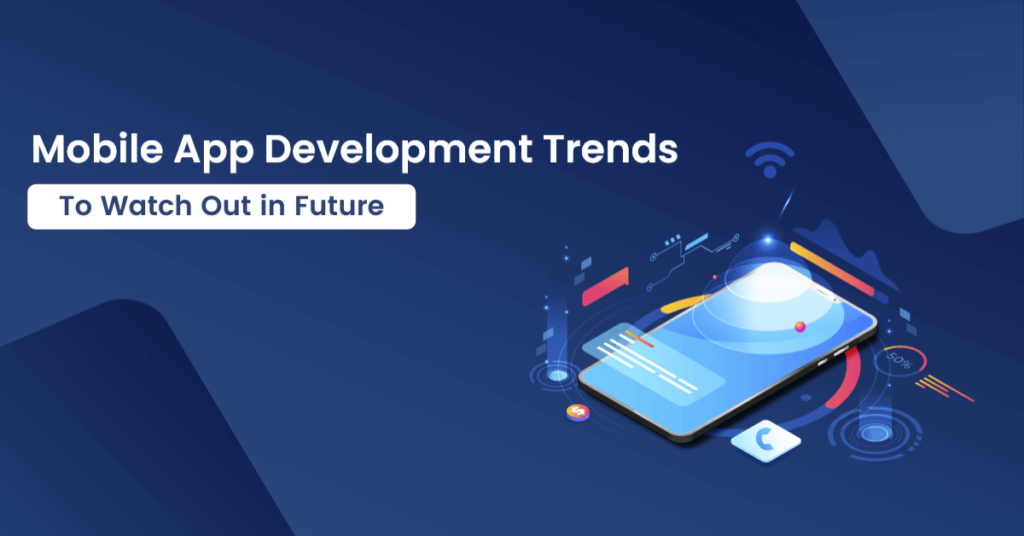Every New Year brings in a new style. Companies that are steady in their execution are rewarded with enduring client loyalty and immeasurable good outcomes.
The core of the e-commerce culture has always been the dedication to prioritizing customer requirements, and this year’s e-commerce mobile app development trends are no exception.
The top digital players and e-commerce companies will lift their game by putting these new trends to the test and incorporating them into their retail/marketplace software solutions. By doing this, they will be able to grow their operations to meet the surge in demand and create a solid go-to-market strategy, giving them a competitive advantage over their rivals.
Here are the top e-commerce app development trends for 2023.
Top Mobile App Trends for E-Commerce in 2023
- Improving Online Shopping with AR/VR

Virtual and augmented reality (AR/VR) technologies are used in almost all e-commerce sectors to provide clients with an enjoyable online shopping experience. Augmented reality and virtual reality technology enhance the online shopping experience for customers by enabling them to virtually try the products on their bodies or in physical stores before placing purchases.
Incorporate AR/VR into the development of e-commerce mobile apps in 2022 to influence how consumers view a brand, help create effective marketing strategies, and advance, modernize, and innovate your business. In the long run, this enjoyable and engaging shopping experience will increase consumer interest in the products and brands.
Because customers will be able to visualize and evaluate if a given purchase will be wise or not, the interactive shopping experience will also help online retailers reduce cart abandonment, product returns, and replacements.
- The Use of Voice Search Will Rise

Voice search functionality is being added to the traditional search and shopping modes. It is not language-specific, thus searching is incredibly quick, simple, and available to everyone. This feature allows consumers to customize their shopping experiences by asking for input in their native tongue and listing the results that are currently accessible on the site.
A sophisticated AI-enabled technology called voice search can understand speech, recognize keywords, and then provide results based on that data. These results could be specific to a brand, category, size, gender, color, fabric, style, and a number of other attributes. In addition to allowing a smooth shopping experience, voice search assists companies and organizations in increasing customer value and boosting performance.
This tech-inspired searching requires speedy result pages, so the site loading page must be quick or it won’t appear in the list of search results. In addition to other benefits, location-specific search would offer a competitive edge, much as how the majority of users seek for nearby items and services.
- Using Upselling and Cross-Selling AI, Increase Leads
Each customer’s search and purchase behavior is examined by AI with machine learning, which then develops an algorithm to customize each user’s buying experience. A customer’s browsing and purchasing behaviors, including the products they initially peruse and ultimately buy, are continuously collected by AI.
Since it compares all the previous data to update the customers’ shopping behaviors, technology is the only thing that can track the purchasing patterns of specific customers. Based on that, AI creates personalized product recommendations to quickly attract and seize the attention of customers. Traditional retail channels won’t be able to offer such tailored consumer service, though.
The AI-enabled e-commerce platform can additionally continuously provide suggestions based on searches in real-time. These suggestions might come in the form of cross-selling or up-selling products from the same or other sellers. Technology advancements also offer specialized customer care and assistance. AI-enabled chat bots integrated into an e-commerce platform provide for personalized and quick customer service. For a Mobile App Development Company California it is and will remain one of the most well-liked and challenging tech integrations in the e-commerce mobile app development space.
- A Focus on Big Data Will Ensure a Personalized Shopping Experience
Big Data assists e-commerce businesses by developing a thorough understanding of their customers. Using big data analytics, businesses can segment their customers based on their gender, location, age, and social media usage. Companies can utilise this data to research customer search and buying habits, create targeted advertising with niche offers, and create campaigns tailored to a certain customer group.
By using data analysis, e-commerce businesses may forecast their customers’ shopping habits and offer personalized shopping advice, both of which increase customer engagement and spending.
With all these abilities, big data will enhance its data analytics for consumer communication with creativity and empathy. E-commerce businesses will also favor big data for data analysis to spot fraudulent activity, harmful behavior, and secure payment options. Because consumers are becoming more concerned about payment-related fraud, big data technology will assist to increase the security of online payments.
- Chat bots Will Totally Rework the Shopping Experience
The use of chat bots has dramatically improved since neural networks were incorporated into the technology a few years ago. Customers today are very impatient and busy, therefore they desire immediate, relevant results rather than spending too much time on an app. These chat bots are crucial to closing the deal swiftly and effectively when making an online purchase because they are equally successful as in-store salespeople.
The AI-powered chat bots offer customer support services that are available 24/7 and ready to help at any time. It reduces client wait times and solves issues as soon as possible. Since these bots are extremely sensitive to human interaction and can understand their emotions, the customer support is given to human customer service so that the problem may be resolved effectively.
Chat bots are a clever and useful solution for managing multiple customers at once in e-commerce. It decreases the demand for human labor and saves money. These tools also don’t get tired of doing the same thing repeatedly or need a break from working long hours, which improves customer service and business productivity.
- Active Distribution Channels and New Markets are Expanding
Products from several manufacturers and dealers are offered on the internet marketplaces. An e-commerce platform’s “third-party sellers,” who utilize the platform’s features, make up the majority of its merchants. These businesses will continue to act as a new marketplace for customers to compare comparable goods from different suppliers.
The fulfillment of the stock supply to the merchants is no longer adequate in the context of online sales; the goods must also be delivered to the ultimate customer. These multiple distribution channels provide fast delivery in response to client requests.
Global marketplaces like Walmart and Amazon offer a variety of distribution methods so that firms can collaborate with one another and serve a large number of clients at once. Small businesses gain a lot from the ease of conducting business and increased customer reach, therefore these merchants are likely to ignore the platform usage cost. The creation of new marketplace apps is a trend that is most likely to persist in the e-commerce industry.
- DeGlobalization
Another trend in mobile app development in 2023 is deglobalization. This term refers to the trend of technology toward a less connected society.
The market for mobile apps for underdeveloped countries is now one of the fastest growing. Nonetheless, residents of many places now have access to mobile material as a result of the widespread circulation of low-cost cell phones. This trend is continuing.
Many countries are likewise interested in developing their own mobile apps. IT firms have long been interested in this prospective industry. They are investing in the creation of mobile applications for the “next billion” customers in India, Africa, and Southeast Asia. Google, for example, created a specific unit for this purpose called Next Billion Users (NBU).
So, by establishing new projects aimed at a specific regional audience, you have every opportunity of success!
- A More Localized and Personalized Customer Experience Granular
Digitalization has expanded the reach of consumers and businesses, making the world market truly global. As a result, businesses don’t need to physically expand their operations in order to connect with customers globally, understand their needs, and offer a hyper-personalized omnichannel experience.
Global consumers expect premium experiences that go above and beyond customer-targeted offerings, making the global market no less relevant than local. The most recent technical developments are applied to offer a customized degree of customer care.
- Various Payment Options For Cult Membership Permanent
Due to the expanding trend of online payments, there are many different digital payment platforms available. These e-commerce platforms must therefore be paired with a choice of payment systems in order to provide clients the utmost simplicity and comfort of alternatives.
Integration of several payment methods lowers cart abandonment, makes checkout simple, increases customer conversion rates, and raises customer satisfaction. Each of these third-party payment systems additionally supports a number of languages, currency converters, and a well-known local payment option that caters to a wide demographic to make it easier to satisfy the needs of clients.
Customers are encouraged to choose the specific e-commerce app solution above other options since it offers so many secure, localized payment options. Evidently, it promotes customer confidence in the online shopping site.
- Blockchain: An Innovation in the E-Commerce Industry
A brilliant technology, blockchain is outperforming its reputation as the “saviour” of all e-commerce industry issues. Blockchain technology has the ability to totally transform the eCommerce sector by establishing a highly secure environment that is attractive to both buyers and sellers/retailers. If we talk about Decentralized eCommerce Platform, there are many types.
Blockchain supports data security, removes data risks or problems related to cyber-attacks, and considerably reduces worries among businesses and customers. The best security for an online database platform is provided by Distributed Ledger Technology (DLT), which is used in its construction. Additionally, it makes it possible to integrate different management systems in order to arrange supply chain procedures and enable open online trade between customers and sellers.
In the not-too-distant future, blockchain will fundamentally transform the online shopping experience and have a huge impact on the e-commerce industry.
- Standardized Shipping & Warehouse Management
Business automation has simplified the procedures for managing warehouses and shipping. The use of automated warehouse management and standardized shipping techniques to expedite the process is encouraged by the intense economic competitiveness of today. The overall customer experience is getting better as a result of continual advancements in the product distribution and shipping process.
All of these processes, such as bar-code identification for distinctive inventory identification, in-stock and out-of-stock tracking, delivery status, product packaging, additional shipping expenses, and many more, are made simple to manage by e-commerce mobile app development. In order to attract more customers, businesses also use cutting-edge techniques, such as providing free delivery options, same-day delivery options, drone delivery, speedy delivery services, etc.
- Current Advances in API-Driven & Headless E-Commerce
The front end and the back end of a headless e-commerce platform are independent of one another and run independently. In the end, it allows for quick and adaptable platform development, and the company owner retains complete control over the site architecture. It makes the process of integrating APIs and modifying every aspect of a website user-friendly.
Because it doesn’t require specialized language understanding, designing a headless e-commerce website is easier. Thanks to the integration of APIs, businesses will be able to quickly react to shifting market conditions, keep up with new trends, and remain competitive while retaining and luring new customers.
A distinctive customer experience can be produced by integrating user-friendly interfaces, free and accelerated delivery services, and other elements into the development of e-commerce apps. An API-driven, headless e-commerce platform is frequently created using the agile development methodology because developing an e-commerce software is typically a challenging procedure.
Wrapping Up
Customer centricity, a test-and-learn culture, and automated processes that enable quick answers are the three areas where businesses must excel if they want to facilitate speed in the e-commerce sector.
According to a study, more than 0.5 percent of successful organizations are prompt to adjust their goods, services, or administrative practices in response to suggestions.
In order to build your company strong, adaptable, and customer-centric from the ground up and advance up the value chain, you must do it right away.

